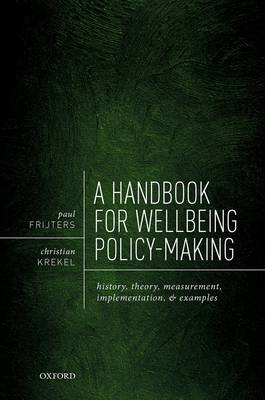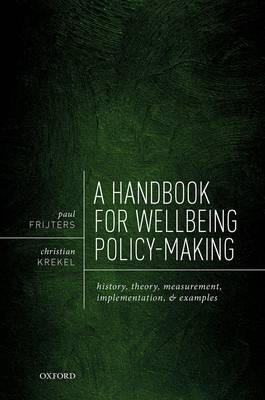
- Retrait gratuit dans votre magasin Club
- 7.000.000 titres dans notre catalogue
- Payer en toute sécurité
- Toujours un magasin près de chez vous
- Retrait gratuit dans votre magasin Club
- 7.000.0000 titres dans notre catalogue
- Payer en toute sécurité
- Toujours un magasin près de chez vous
A Handbook for Wellbeing Policy-Making
History, Theory, Measurement, Implementation, and Examples
Paul Frijters, Christian Krekel
Livre relié | Anglais
217,95 €
+ 435 points
Description
This is an open access title. It is available to read and download as a free PDF version on the Oxford Academic platform. It is made available under a Creative Commons Attribution-Non Commercial-No Derivatives 4.0 International licence. Around the world, governments are starting to directly measure the subjective wellbeing of their citizens and to use it for policy evaluation and appraisal. What would happen if a country were to move from using GDP to using subjective wellbeing as the primary metric for measuring economic and societal progress? Would policy priorities change? Would we continue to care about economic growth? What role would different government institutions play in such a scenario? And, most importantly, how could this be implemented in daily practice, for example in policy evaluations and appraisals of government analysts, or in political agenda-setting at the top level? This volume provides answers to these questions from a conceptual to technical level, by showing how direct measures of subjective wellbeing can be used for policy evaluation and appraisal, either complementary in the short-run or even entirely in the long-run. It gives a brief history of the idea that governments should care about the happiness of their citizens, provides theories, makes suggestions for direct measurement, derives technical standards and makes suggestions on how to conduct wellbeing cost-effectiveness and cost-benefit analyses, and gives examples of how real-world policy evaluations and appraisals would change if they were based on subjective wellbeing. In doing so, it serves the growing interest of governments as well as non-governmental and international organisations in how to put subjective wellbeing metrics into policy practice.
Spécifications
Parties prenantes
- Auteur(s) :
- Editeur:
Contenu
- Nombre de pages :
- 464
- Langue:
- Anglais
Caractéristiques
- EAN:
- 9780192896803
- Date de parution :
- 27-07-21
- Format:
- Livre relié
- Format numérique:
- Genaaid
- Dimensions :
- 155 mm x 231 mm
- Poids :
- 861 g

Les avis
Nous publions uniquement les avis qui respectent les conditions requises. Consultez nos conditions pour les avis.






